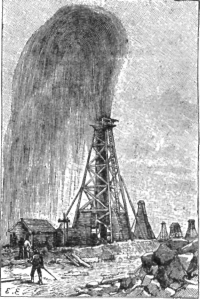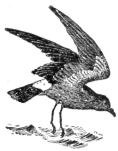PETRARCH 1462 PETROLEUM
Description
This page of the book is from "The New Student's Reference Work: Volume 3" by Chandler B. Beach, Frank Morton McMurry and others.
PETRARCH 1462 PETROLEUM
guished from the general stalk or petiole of the whole leaf.
Petrarch (pe'trark), Frances'co, one of
the earliest and greatest of modern lyric poets, was born at Arezzo, Italy, July 20, 1304, his parents being exiled from Florence at the time. The poet's infancy was passed in Tuscany until 1312, when his father determined to go to Avignon, whither the papal court had been transferred. There his studies began, and were continued later at Montpellier and Bologna. After his father's death Petrarch returned to Avignon. Having lost a large portion of his patrimony, he qualified for ecclesiastical preferment, but never took holy orders. It was in this early period that he first saw Laura, whose name he has immortalized in his lyrics, and who inspired him with a passion which, although unrequited, has become proverbial for its constancy and purity. The fame of Petrarch's learning and genius was such that he received the highest consideration from rulers and learned men; but the most glorious day of his life was when he was crowned poet-laureate by the senate of Rome on Easter Sunday of 1341. He died on July 18, 1374. See Henry Reeve's little book on Petrarch.
Pet'rel, the name for small sea-birds often seen flying over the ocean, the smallest of the web-footed birds. By the sailors they are commonly called Mother Carey's chickens. There are two kinds in the North Atlantic: Wilson's petrel and Leach's. The former nests in the southern hemisphere in February, and comes north in May. It is the form most frequently seen in crossing the Atlantic. They follow the ship for food thrown overboard. Leach's petrel nests on our coast from Maine northward, the nest a burrow under rock or in the ground, one white egg therein. Both these birds are small, being about seven and one half inches long. They are black with a white spot on the upper side at the base of the tail. Petrels number about seventy species. Several inhabit the southern seas, and the group includes the giant fulmar, about the size of one of the smaller albatrosses. The name petrel is a diminutive of Peter, and refers to the appearance they present of walking on the water.
Pe'trie, William M. F., an English author and explorer, was born at Charlton, England, June 3, 1853. Having been educated privately, he early devoted himself to a study of ancient British earthworks, but in 1880 turned his attention to the Nile
valley, where he has been practically ever since, although holding a professorship in University College, London, in the department of Egyptology. He discovered the Greek settlements at Naukratis and Daphnę; the prehistoric Egyptian settlement at Koptos; and the home of a new race at Nagada. He published an inscription of the Israelite war at Thebes. During the 20 years he has been in Egypt he has published 21 volumes upon the life and history of the ancient Egyptians. Perhaps that which attracted the most attention was the report of his work at Tel-el-Amarna, a modern Arab village on the eastern side of the Nile, midway between ancient Thebes and Memphis, where Amenophis IV, the "heretic" king, built his royal residence about 1500 B. C. A great many tablets in cuneiform characters were found, which are in the museums of London, Berlin and Cairo. These are mostly reports from the east, and contain many names known to Bible students.
Petro'leum, a fluid bitumen (q. v.), also known'as mineral oil, rock-oil etc. In nature it occurs principally m the pores of porous rock. It is extracted from the rock through

OUTBURST OF PETROLEUM FROM WELL
wells, the same as water. The origin of petroleum has been much discussed, and the general belief is that it represents a distillation product of organic matter which was buried in the sediments when they accumulated. It is quite probable that both animal and plant matter have contributed to the production of petroleum. In profit-

PETREL


